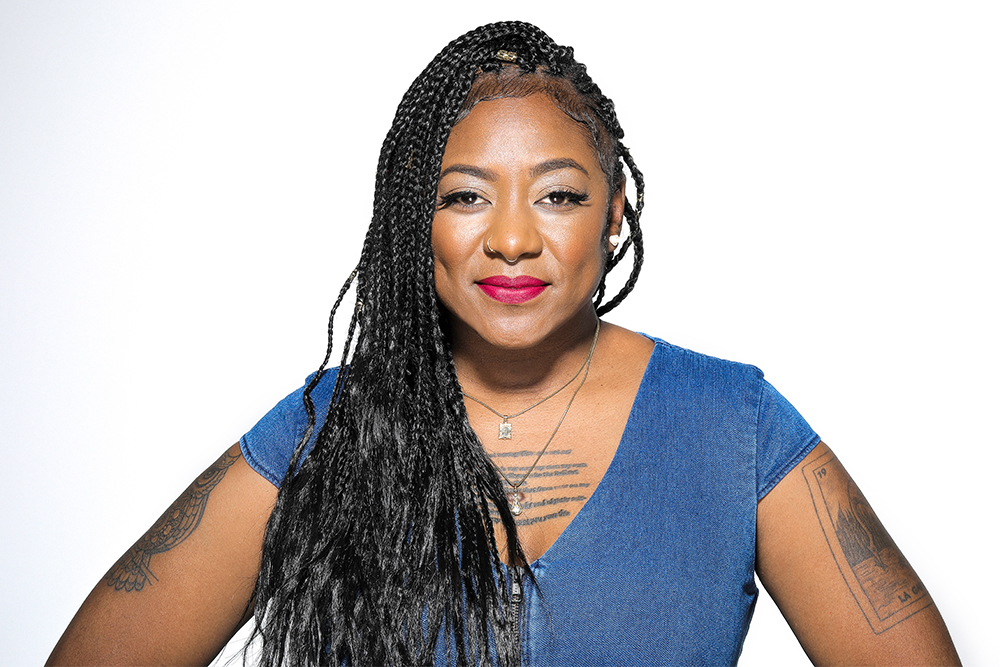Co-founder of the Black Lives Matter movement Alicia Garza will speak at Eastern Mennonite University (EMU) during the Center for Justice and Peacebuilding’s 25th Anniversary Celebration banquet on June 5, 2021.
“This is an unparalleled privilege that Alicia Garza accepted our invitation to be our keynote speaker; what an honor,” said Patience Kamau, anniversary committee chair.
The celebration, a three-day event from June 4-6, is all virtual.
“We know our prospective guests will be attending from many different time zones, which means live attendance may not be possible,” said Kamau. “All sessions will be recorded and we ask that you register in order to receive the links to recordings after the event.”
It will also feature sessions with CJP co-founder John Paul Lederach, 2019 MacArthur Fellow and restorative justice attorney sujatha baliga, Ahimsa Collective founder Sonya Shah, an alumni gathering and oral histories with women critical in founding CJP and former executive directors of the center. On Sunday, Executive Director Jayne Docherty gives a “State of the Center” address.
‘A lot to learn’
After postponing the 2020 celebration, Kamau and Docherty were thrilled at Garza’s willingness to reschedule a year in advance.
“We have a lot to learn from Alicia Garza,” said Docherty. “More students enrolling in our programs are bringing a focus on undoing the continuing legacy of racism, white supremacy, genocide of native peoples, and other forms of oppression in the United States.”
Garza is one of the three co-founders of Black Lives Matter. Garza, Opal Tometi, and Patrisse Khan-Cullors started the first chapter in 2013 in response to the acquittal of Trayvon Martin’s murderer, George Zimmerman. According to their website, the global Black Lives Matter network “is a chapter-based, member-led organization whose mission is to build local power and to intervene in violence inflicted on Black communities by the state and vigilantes.”
The movement gained prominence in 2014 for activism in Ferguson, Missouri, after the murder of Mike Brown by police officer Darren Wilson. Now, the movement has over 40 chapters in four countries.
Garza: Racism the ‘least understood’ phenomenon in this country
Garza, who is based in Oakland, California, currently serves as the special projects director for the National Domestic Workers Alliance, which advocates for domestic workers in the U.S. In 2019, she helped launch Supermajority, a membership-based organization that aims to build equity and power among women in America through advocacy, community building, and electoral participation.
She is also the principal at Black Futures Lab, a project to build “Black political power” and influence and transform black communities. One of their initiatives, the Black Census, polled over 30,000 African Americans on the issues they face and tangible solutions to those problems. The census is “the largest survey of Black people conducted in the United States since Reconstruction,” according to their website.
“I think race and racism is probably the most-studied social, economic, and political phenomenon in this country, but it’s also the least understood,” Garza said in a 2016 TED Talk. “The reality is that race in the United States operates on a spectrum from black to white. It doesn’t mean that people who are in between don’t experience racism, but it means that the closer you are to white on that spectrum, the better off you are, and the closer to black that you are on that spectrum, the worse off you are.”
As Garza identifies as a “queer Black woman,” she brings an intersectional lens to her justice work, addressing racial issues alongside those of gender, sexual orientation, and gender identity.
Garza’s first book, The Purpose of Power: How We Come Together When We Fall Apart (Doubleday, 2021), was published earlier this year. Her writings have been featured in the New York Times, Essence, The Guardian, and many more. Among other awards, she was recognized as one of the most influential African Americans by The Root in 2016.
